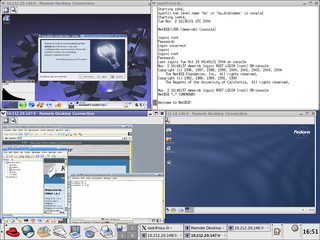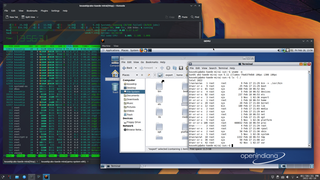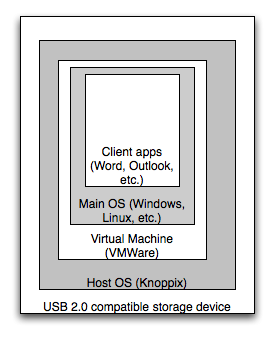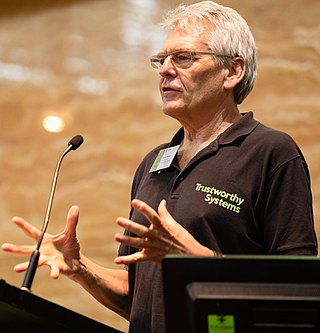
Andrew Stuart Tanenbaum, sometimes referred to by the handle ast, is an American-Dutch computer scientist and professor emeritus of computer science at the Vrije Universiteit Amsterdam in the Netherlands.
In computing, a virtual machine (VM) is the virtualization or emulation of a computer system. Virtual machines are based on computer architectures and provide the functionality of a physical computer. Their implementations may involve specialized hardware, software, or a combination of the two. Virtual machines differ and are organized by their function, shown here:

Xen is a free and open-source type-1 hypervisor, providing services that allow multiple computer operating systems to execute on the same computer hardware concurrently. It was originally developed by the University of Cambridge Computer Laboratory and is now being developed by the Linux Foundation with support from Intel, Citrix, Arm Ltd, Huawei, AWS, Alibaba Cloud, AMD, Bitdefender and epam.

Peter James Denning is an American computer scientist and writer. He is best known for pioneering work in virtual memory, especially for inventing the working-set model for program behavior, which addressed thrashing in operating systems and became the reference standard for all memory management policies. He is also known for his works on principles of operating systems, operational analysis of queueing network systems, design and implementation of CSNET, the ACM digital library, and codifying the great principles of computing. He has written numerous influential articles and books, including an overview of fundamental computer science principles, computational thinking, and his thoughts on innovation as a set of learnable practices.
A hypervisor is a type of computer software, firmware or hardware that creates and runs virtual machines. A computer on which a hypervisor runs one or more virtual machines is called a host machine, and each virtual machine is called a guest machine. The hypervisor presents the guest operating systems with a virtual operating platform and manages the execution of the guest operating systems. Unlike an emulator, the guest executes most instructions on the native hardware. Multiple instances of a variety of operating systems may share the virtualized hardware resources: for example, Linux, Windows, and macOS instances can all run on a single physical x86 machine. This contrasts with operating-system–level virtualization, where all instances must share a single kernel, though the guest operating systems can differ in user space, such as different Linux distributions with the same kernel.
In computing, paravirtualization or para-virtualization is a virtualization technique that presents a software interface to the virtual machines which is similar, yet not identical, to the underlying hardware–software interface.

QEMU is a free and open-source emulator. It emulates the machine's processor through dynamic binary translation and provides a set of different hardware and device models for the machine, enabling it to run a variety of guest operating systems. It can interoperate with Kernel-based Virtual Machine (KVM) to run virtual machines at near-native speed. QEMU can also do emulation for user-level processes, allowing applications compiled for one architecture to run on another.
Platform virtualization software, specifically emulators and hypervisors, are software packages that emulate the whole physical computer machine, often providing multiple virtual machines on one physical platform. The table below compares basic information about platform virtualization hypervisors.
OS-level virtualization is an operating system (OS) paradigm in which the kernel allows the existence of multiple isolated user space instances, called containers, zones, virtual private servers (OpenVZ), partitions, virtual environments (VEs), virtual kernels, or jails. Such instances may look like real computers from the point of view of programs running in them. A computer program running on an ordinary operating system can see all resources of that computer. However, programs running inside of a container can only see the container's contents and devices assigned to the container.

SoulPad is a mobile computing project developed by researchers at IBM. The project's aim is to provide a computer user with the ability to suspend their operating system and resume it on another computer using a USB data storage device. The SoulPad project is the subject of a paper entitled Reincarnating PCs with Portable SoulPads, which won Best Paper at the 2005 ACM/USENIX MobiSys conference. A demo video of the technology in action was made available on IBM's website.
In computing, hardware-assisted virtualization is a platform virtualization approach that enables efficient full virtualization using help from hardware capabilities, primarily from the host processors. A full virtualization is used to emulate a complete hardware environment, or virtual machine, in which an unmodified guest operating system effectively executes in complete isolation. Hardware-assisted virtualization was added to x86 processors in 2005, 2006 and 2010 (respectively).
George Varghese is a Principal Researcher at Microsoft Research. Before joining MSR's lab in Silicon Valley in 2013, he was a Professor of Computer Science at the University of California San Diego, where he led the Internet Algorithms Lab and also worked with the Center for Network Systems and the Center for Internet Epidemiology. He is the author of the textbook Network Algorithmics, published by Morgan Kaufmann in 2004.
The following is a timeline of virtualization development. In computing, virtualization is the use of a computer to simulate another computer. Through virtualization, a host simulates a guest by exposing virtual hardware devices, which may be done through software or by allowing access to a physical device connected to the machine.

Özalp Babaoğlu, is a Turkish computer scientist. He is currently professor of computer science at the University of Bologna, Italy. He received a Ph.D. in 1981 from the University of California at Berkeley. He is the recipient of 1982 Sakrison Memorial Award, 1989 UNIX International Recognition Award and 1993 USENIX Association Lifetime Achievement Award for his contributions to the UNIX system community and to Open Industry Standards. Before moving to Bologna in 1988, Babaoğlu was an associate professor in the Department of Computer Science at Cornell University. He has participated in several European research projects in distributed computing and complex systems. Babaoğlu is an ACM Fellow, a resident fellow of the Institute of Advanced Studies at the University of Bologna and has served on the editorial boards for ACM Transactions on Computer Systems, ACM Transactions on Autonomous and Adaptive Systems and Springer-Verlag Distributed Computing.

Gernot Heiser is a Scientia Professor and the John Lions Chair for operating systems at UNSW Sydney, where he leads the Trustworthy Systems group (TS).

Mendel Rosenblum is a professor of Computer Science at Stanford University and co-founder of VMware.
Edouard "Ed" Bugnion is a Swiss software architect and businessman.
GPU virtualization refers to technologies that allow the use of a GPU to accelerate graphics or GPGPU applications running on a virtual machine. GPU virtualization is used in various applications such as desktop virtualization, cloud gaming and computational science.

ACM SIGOPS is the Association for Computing Machinery's Special Interest Group on Operating Systems, an international community of students, faculty, researchers, and practitioners associated with research and development related to operating systems. The organization sponsors prestigious international conferences related to computer systems, operating systems, computer architectures, distributed computing, and virtual environments. In addition, the organization offers multiple awards recognizing outstanding participants in the field, including the Dennis M. Ritchie Doctoral Dissertation Award, in honor of Dennis Ritchie, co-creator of the renowned C programming language and Unix operating system.
Dawson R. Engler is an American computer scientist and an associate professor of computer science and electrical engineering at Stanford University.








